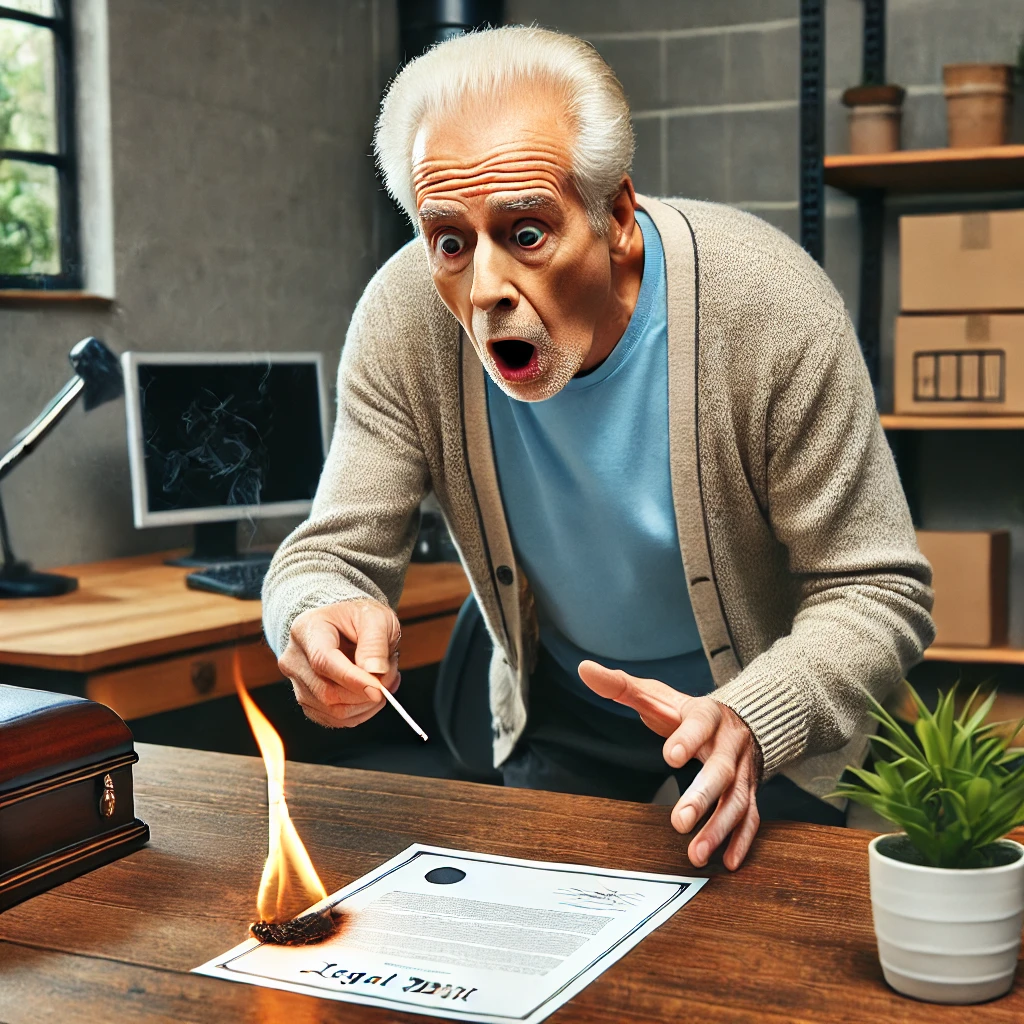A ‘lost’ Will is not automatically a ‘revoked’ Will – lost vs revoked
A Will is valid until it is intentionally revoked by the Will-maker. The Will-maker must be of sound mind to revoke a Will. A person holding a POA for the Will-makers cannot destroy a Will. Or rather, a person holding your POA can not revoke your Will.
What happens if the Will cannot be found? What if you can only find a copy of the original Will? Being ‘lost’ is not the same as being ‘revoked’.
Was the Will lost? Was it:
- hidden to preserve it?
- misplaced either by the will-maker or somebody else?
- destroyed by mistake, such as in a house fire?
- destroyed without the Will-maker’s permission?
If the Will has been lost (rather than revoked) you seek to prove an unsigned copy or signed copy of the Will. Even a Will that was never signed can potentially be enforced by the court. You need to prove to the Probate office:
- the unsigned copy of the Will is accurate
- the Will was validly signed and witnessed; and
- the Will-maker did not intentionally destroy the Will
If the Will was built on our law firm’s website then you can log back in and get an unsigned copy of the Will.
If there are no records, the executor faces the onerous task of retracing what happened to the signed Will and locating the witnesses.
The executor may also need to obtain consent from anyone who is adversely affected by the lost Will being approved. This is usually the deceased’s family who would receive the estate on intestacy.
But the Will was with the deceased
If the Will was last known to be with the Will-maker then it is presumed that the Will-maker intentionally destroyed the Will – thus revoking it. Therefore, as part of proving the true copy of the Will, in the above case, you must establish that the original Will was held by someone other than the deceased. See Re Estate of Hall (Deceased) [2011] SASC 117.
If you die without a Will then the intestacy rules apply. You get the power to make a Will from each State’s legislation. An older Will may prevail if the ‘latest’ now revoked Will was never valid in the first place.
Alternatively, if you make a valid new Will, this destroys the old Will. If you now destroy the new Will this does not magically allow the old Will to be operational again. In that case, you die intestate – without a Will.
Keep your Will safe
Keeping an original Will safe and secure is important. Also, let your executors, family or a trusted friend, know where it is stored.
Free storage and monitoring of your signed Wills
Your original signed Legal Consolidated Will is valuable. Keep it safe and let your Executors know where it is stored. (You may wish to email a soft copy of your Will to the Executors.)
- You can store a signed Legal Consolidated Will at home, at the bank or with the Executors.
- Alternatively, you can store your Legal Consolidated Will with another law firm that specialises in Will storage. There is no cost to you. Email admin@legalconsolidated.com.au and we will let you know how to proceed with storing your Will in that law firm’s safe custody. The other law firm monitors death notices. When you die they use your best endeavours to get the original Will into your executor’s hands. They also show your executors how to administer your estate. Legal Consolidated does not provide this service. It is provided by another law firm that specialises in storing and monitoring Wills. Legal Consolidated has no involvement or relationship with the other law firm.
Forget about the Will maker: is the Will itself valid?
A second question: ‘Is the Will valid in the first place?’
Bailey v Bailey (1924) 34 CLR 558 looks at what is a valid Will:
- The onus of proving that an instrument is the Will-maker’s last Will is with you, the party propounding it. “He who seeks must prove”.
- The court determines the Will’s validity on the balance of all of the evidence. The Court considers everything.
- You discharge the onus by establishing a ‘prima facie’ case. (‘Prima facie’ means based on the first impression; accepted as correct until proved otherwise.)
- How do you prove a prima facie case? The Court after hearing your testimony is satisfied the Will is the last Will of a free and capable will-maker.
- The Court considers the Will-maker’s mental capacity. It is about the mind, not about the body. A person of sound mind can sign their Will with the pen in their mouth or their toes.
- How much evidence is sufficient for a valid Will? This depends on the circumstances of each case. Consider:
- the simplicity or complexity of the gifts (specific gifts are bad)
- rational or irrational provisions
- exclusion or non-exclusion of beneficiaries
- the exclusion of persons naturally having a claim upon the Will-maker’s estate (e.g. children, spouse, close relatives)
- the Will-maker’s extreme age and any sickness
- does any person have motive and opportunity? Does that person exercise undue influence? Does that person, or a related party take a substantial benefit under the Will?
- is there a doctor’s certificate stating the will-maker is of sound mind?
- Upon establishing a prima facie case of sound mind, memory and understanding, the onus of proof switches to the party challenging the Will.
- To displace a prima facie case of capacity and due signing, mere proof of serious illness is not sufficient. There must be clear evidence that undue influence was exercised, or that the illness of the will-maker so affected their mental faculties as to make them unable to validly dispose of their property.
- The opinion of the Will’s two witnesses as to the testamentary capacity is usually of little weight on the direct issue. Instead, the court decides the question of capacity. This is based on facts, not opinions. What the witnesses thought and what a doctor’s certificate states are useful. But it is a judge in a court of law that makes the call. This is as to whether the will-maker had the mental capacity to sign a Will.
- A legally prepared Will, such as a Will prepared by Legal Consolidated, carries greater weight.
- Where instructions for a Will are given some time before its signing, it is the capacity at the date of giving the instructions that is most relevant.
Is the destruction of the Will valid?
A will-maker who lacks mental capacity no longer can revoke their Will. In contrast, a person, of sound mind who is not being coerced, can at any time revoke their Will. (This is possible, even though you are bound by a Contractual Mutual Will.)
If you are of unsound mind and tear up your Will then the Will is still valid. Try as you might, if you are of unsound mind, you can no longer:
- make a new Will
- destroy your old Will
Is there a formal process for retrieving and destroying our previous Wills and POA’s from our old lawyers?
You don’t need to destroy old Wills. You don’t need to tell anyone you made new Wills. It is a private and personal matter. You can if you wish, contact the old lawyers and ask them to destroy the old Wills. The Public Trustee often get upset when you tell them you made new Wills. They stamp their feet and demand that you send them the original Will or at least a copy. Most people tend to ignore the Public Trustee and State Trustee in Victoria’s demands – which is good advice.
Doctor’s certificate vs knowing what is in your Will
- You can be of sound mind.
- A person may not be able to prove your Will is unfair.
- But there is a third little-known attack on your Will. “Do you understand how you are giving away your assets?”
This third attack on your Will is not about the Will-maker’s testamentary capacity. It is not about whether your Will is ‘fair’ to who can challenge your Will.
The question is “Does the Will-maker understand who is getting what in the Will?” You must know and approve of the contents of your Will. This is different from the question of the Will’s validity and your testamentary capacity.
Now, sure, especially with Divorce Protection Trusts, bankruptcy trusts and 3-Generation Testamentary Trusts you do not need to prove that the willmaker was capable of understanding every clause in the Will.
It is enough that the will-maker is the main thrust of the gifting provisions. Leaving everything to each other and everything to the children when both of you are dead is straightforward. But leaving specific gifts and life estates adds complexity.
It never ceases to amaze me how junior lawyers tolerate specific gift clauses in Wills for jewellery, holiday homes and tools in the garage. A do not get me started on the stupidity of life estates and rights to reside.
The more complexity and ‘ruling from the grave’ clauses you put in the Will the higher the onus of proving that the Will-maker knew how the gifts would end up.
Hoff v Atherton [2005] WTLR 99
See Hoff v Atherton [2005] WTLR 99.
The greater the complexity of the gifts the higher the evidence required. With specific gift clauses, there is a higher level of understanding of the assets.
This is not about the Will-maker being of sound mind. This is a separate question. Did the Willmaker know and approve what is in the Will?
The Will maker may:
- have the full mental capacity
- suffer from no undue influence
and still not be able to prove the Will because the specific gifts are too complex.
Should I tear up old Wills and POA’s?
You do not need to destroy old Wills. You do not need to tell anyone you made new Wills. It is a private and personal matter. Legal Consolidated Wills are drafted so that they override and replace old Wills.
However, if you have any old Wills it is best to tear them up.
The Public Trustee often gets upset when you tell them you made new Wills. They stamp their feet and demand that you send them the original Will or at least a copy. Most people tend to ignore the Public Trustee and the Victorian State Trustee.
Does a Legal Consolidated Will revoke an old Public Trustee Will?
Q: My elderly parent’s Wills are trapped with the Public Trustee. I want to make new Wills appointing myself and my brother as the executors. This is so as to not waste money with the Public Trustee.
However, my Dad is now in a hospital in palliative care. He is unlikely to return home. The Public Trustees said the new Will has to expressly render the old Will null and void.
A: All Legal Consolidated Wills automatically revoke previous Wills. This includes Wills prepared by the Public Trustee and Victorian State Trustee.
Secondly, the Public Trustee is worried about whether your Dad still has mental capacity. As you build your dad’s Will on our law firm’s website we:
- guide you through the question of capacity; and
- show you how to sign a Legal Consolidated Will in isolation or hospital.
This is how to build Wills for your parents.
Mental Capacity for Australian Wills
The classic test is set out in Banks v Goodfellow (1870) LR 5 QB 549, at 565. The Will maker must:
(a) understand the nature of his act, i.e. signing the Will, and its effects;
(b) understand the extent of the property of which he is disposing; and
(c) must be able to comprehend and appreciate the claims to which he might give effect;
(d) not be subject to any disorder of the mind as shall “poison his affections, pervert his sense of right, or prevent the exercise of his natural faculties”.
You must have the mental capacity to make decisions that take into account the relevant property, persons and circumstances and arrive at a “rational, fair and just” testament. See Abbott v Richardson [2006] WTLR 1567, at 1627.
Cases on the validity of Wills
- Banks v Goodfellow (1869-70) LR 5 QB 549
- Blackman & ors v Man [2007] EWHC 3162 (Ch); [2008] WTLR 389 ChD
- Carr & ors v Beaven & ors [2008] EWHC 2582 (Ch)
- Couwenbergh v Valkova [2008] EWHC 2451 (Ch); WTLR(w) 2008-20
- Cowderoy v Cranfield [2011] EWHC 1616 (Ch); [2011] WTLR 1699 ChD
- Edkins v Hopkins & ors [2016] EWHC 2542 (Ch); [2017] WTLR 39 ChD
- Fuller v Strum [2001] EWCA Civ 1879; [2002] WTLR 199 CA
- Gardiner v Tabet & anor [2021] EWHC 563 (Ch); [2020] WTLR 931 ChD
- Gestmin SGPS SA v Credit Suisse (UK) Ltd & anr [2013] EWHC 3560 (Comm)
- Gill v Woodall & ors [2010] EWCA Civ 1430; [2011] WTLR 251 CA
- Harwood v Baker (1840) 3 Moo PC 282
- Hawes v Burgess & anr [2013] EWCA Civ 74; [2013] WTLR 453 CA
- Hoff & ors v Atherton [2004] EWCA Civ 1554; [2005] WTLR 99 CA
- Hughes v Pritchard & ors [2022] EWCA Civ 386; [2022] WTLR 993 CA
- In re Crerar (1956) 106 LJ 694
- Key & anr v Key & ors [2010] EWHC 408 (Ch); [2010] WTLR 623 ChD
- Kostic v Chaplin [2007] EWHC 2909 (Ch); [2007] EWHC 2298 (Ch); [2008] WTLR 655
- Martin & anor v Kogan & ors [2017] EWHC 2927 (IPEC)
- Minns v Foster (2002) unreported, Ch, 13 December
- Mundil-Williams v Williams & ors [2021] EWHC 586 (Ch); WTLR(w) 2021-11
- Parker v Felgate (1883) 8 PD 171
- Perrins v Holland & ors [2010] EWCA Civ 840; [2010] WTLR 1415 CA
- Re Clitheroe [2021] EWHC 1102 (Ch); [2021] WTLR 449 ChD
- Reeves v Drew [2022] EWHC 159 (Ch); WTLR(w)-2022-08
- Schrader v Schrader [2013] EWHC 466 (Ch); [2013] WTLR 701 ChD
- Sharp & anr v Adams & ors [2006] EWCA Civ 449; [2006] WTLR 1059 CA
- Simon v Byford & ors [2014] EWCA Civ 280; [2014] WTLR 1097 CA
- Todd v Parsons & ors [2019] EWHC 3366 (Ch); [2020] WTLR 305 ChD
- Wharton v Bancroft & ors [2011] EWHC 3250 (Ch); [2012] WTLR 693 ChD
- Wrangle v Brunt & anr [2021] EWHC 368 (Ch); [2021] WTLR 1143 ChD
- Zorbas v Sidiropoulous (No 2) [2009] NSWCA 197
Both Bundles protect you from death duties, divorcing and bankrupt children and a 32% tax on super.
Build online with free lifetime updates:
Couples Bundle
includes 3-Generation Testamentary Trust Wills and 4 POAs
Singles Bundle
includes 3-Generation Testamentary Trust Will and 2 POAs
Death Taxes
- Australia’s four death duties
- 32% tax on superannuation to children
- Selling a dead person’s home tax-free
- HECs debt at death
- CGT on dead wife’s wedding ring
- Extra tax on Charities
Vulnerable children and spend-thrifts
- Your Will includes:
- Divorce Protection Trust if children divorce
- Bankruptcy Trusts
- Special Disability Trust (free vulnerable children in Wills Training Video)

- Guardians for under 18-year-old children
- Considered person clause to stop Will challenges
Second Marriages & Challenging Will
- Contractual Will Agreement for second marriages
- Wills for blended families
- Do Marriages and Divorce revoke my Will?
- Can my lover challenge my Will?
- Make my Will fair: hotchpot clauses v Equalisation?
What if I:
- have assets or beneficiaries overseas?

- lack mental capacity to sign my Will?
- sign my Will in hospital or isolating?
- lose my Will or my home burns down?
- have addresses changed in my Will?
- have nicknames and alias names?
- want free storage of my Wills and POAs?
- put Specific Gifts in Wills
- build my parent’s Wills?
- leave money to my pets?
- want my adviser or accountant to build the Will for me?
Assets not in your Will
- Joint tenancy assets and the family home
- Loans to children, parents or company
- Gifts and forgiving a debt before you die
- Who controls my Company at death?
- Family Trusts:
- Changing control with Backup Appointors
- losing Centrelink and winding up Family Trust
- Does my Family Trust go in my Will?
Power of Attorney
 Money POAs: NSW, VIC, QLD, WA, SA, TAS, ACT & NT
Money POAs: NSW, VIC, QLD, WA, SA, TAS, ACT & NT
- be used to steal my money?
- act as trustee of my trust?
- change my Superannuation binding nomination?
- be witnessed by my financial planner witness?
- be signed if I lack mental capacity?
- Medical, Lifestyle, Guardianships, and Care Directives:
- Company POA when directors go missing, insane or die
After death
- Free Wish List to be kept with your Will
- Burial arrangements
- How to amend a Testamentary Trust after you die
- What happens to mortgages when I die?
- Family Court looks at dead Dad’s Will

